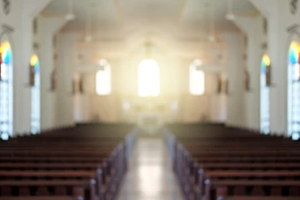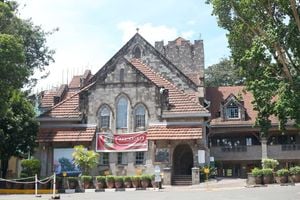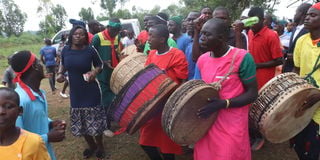
Members of Roho Church dance during the funeral service of former Superior Cardinal Joseph Ager Yugi at Gul Kagembe Village in Rangwe Constituency on January 14, 2024.
Funerals or deaths are naturally marked by sad faces, tears and wailing. Whenever someone died, family members would alert the whole neighbourhood by wailing.
This would attract all the relatives in the village, who would join in the wailing at the deceased's home.
Within the Luo community, the grief would continue until the deceased is buried. But one church in the region has introduced a new way of doing things among its members.
They believe it is a rite of passage that prepares the spirit of the deceased for a journey to the next world, and that mourning would be a sign of little or no faith. The Roho Church sees death as a step from real life to the spirit world.
The church is one of the traditional African denominations with a strong belief in God and Christianity.
Over the years since its inception, Roho has established new churches and acquired new names when members, under the guidance of the Holy Spirit, decide to set up bases in new places and convert more people to join the church.
Some of these include Roho Musalaba, Roho Nineve, Roho Jerusalem, Roho Mowar, Roho Musanda and others with different flags to represent them.
Most members of the church, who also wear different robes of different colours depending on what inner spirits decide, are Luos and the church has a huge concentration in Nyanza.
The Roho church also extends into Western Kenya.
Funeral programmes of church members are usually accompanied by the beating of drums, clapping and rhythmic dancing.
Mr Raymond Obonyo, the priest in charge of the Roho Israel Church of Christ (ICC) in Oneno Nam, Homa Bay County, explains that only family members of a deceased person should cry.
He says mourning should take place at least three days after the death.
"The rest of the days are for celebration as the family waits to bury their loved ones," says the clergyman.
Mr Obonyo is in charge of seven Roho churches and has performed the mourning dance at several funerals in Homa Bay.
He says when people wail at a funeral, it is believed that God may not accept the spirit of the deceased immediately.
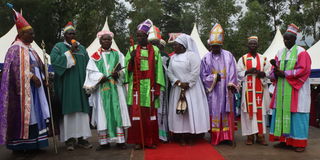
Senior Roho Church officials during the funeral service of Superior Cardinal Joseph Ager Yugi at Gul Kagembe village in Rangwe Constituency on January 14, 2024.
"Members of our church believe that people ascend to heaven when they die. But the ascension should be straight without wasting time," says Mr Obonyo.
Members of the church are known to be very religious.
In Luo land, a male member of the church is known as Japolo (man of heaven), while a woman is called Nyapolo (woman of heaven).
Some are believed to have the power to heal, predict the future or perform miracles.
All believe they will one day ascend to heaven when they die.
When this happens, other church members rejoice as the deceased begins his or her journey to God. Mr Obonyo says their celebration is meant to signify the transition from one world to another.
He explains it simply by saying that many people die and their spirits go to heaven.
In heaven, he believes, God has a record of each person on earth that must be checked before the spirit passes through the pearly gates (the gateway to heaven according to some Christian denominations).
"Imagine the spirits being told to wait because some people on earth are weeping. We all want to go to heaven," says Mr Obonyo.
He adds that too much crying increases the anger of the bereaved.
So instead of mourning, they sing songs of praise, describing the deceased as a hero.
Pastor Godwin Okoth of the Roho Yie Christian Fellowship Church and Bishop Samuel Otiende of Roho Okwe (Peace Roho Israel) agree.
They usually have songs called tich ngato noluwe (you will be judged by your deeds) and mayienga piny oserumo (the world is coming to an end).
Others composed songs to highlight what the dead had done in life, such as helping the poor or interceding for others.
Members of the church attended the funeral of Roho Chang Maler Superior Cardinal Joseph Ager Yugi at Gul Kagembe village in Rangwe on Sunday, where they showed off their dance skills.
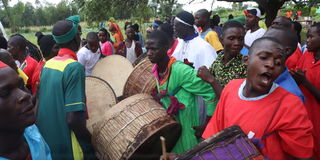
Members of Roho Church dance during the funeral service of former Superior Cardinal Joseph Ager Yugi at Gul Kagembe Village in Rangwe Constituency on January 14, 2024.
At the funeral, more than 1,000 members of the church joined in the rhythmic dance as the body of the deceased, which was in a white coffin, was lifted by a group of masculine men while the others danced.
Yugi was a senior member and one of the founders of the Roho Chang Maler Church, so his funeral had to be a little different as the mourners added more energy to their dance.
Young and old, women and men danced to the mourning tune.
A group of young people set the rhythm for the whole church, beating drums that had been heated to tighten the hides used to make the instruments.
The young people would then take on different roles in beating the drums. Some beat the drums quickly, others more slowly. But the beats are synchronised.
Other sounds are produced by ongeng' (a metal ring that is struck with a metal rod to produce a bell-like sound).
Other people would blow the vuvuzela, while others would clap their hands.
They all do this by moving their bodies up and down to the rhythm.
For some, the dance would go beyond what most people do.
They would either jump up or spin around several times at high speed while dancing. Some would even roll on the ground.
Mr Obonyo says all these activities are done as a sign that the deceased has ascended to heaven.
"We believe that God can forgive sins and during the dance, sins committed by the deceased can be forgiven," the clergyman says. Pastor Okoth says church members do not show sadness when someone dies. Instead, he says, people should celebrate the achievements of the deceased.
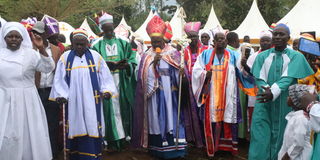
Senior Roho Church officials during the funeral service of Superior Cardinal Joseph Ager Yugi at Gul Kagembe village in Rangwe Constituency on January 14, 2024.
"Everyone has an achievement in life. After death, that is what should be remembered and celebrated, not his or her death," says Pastor Okoth.
He further explains that life on earth is like a journey and death is the end of the journey, so during funerals, members of the church would only "say goodbye" to the deceased.
"We just celebrate and pray to God to open the door to heaven for our departed loved ones. We celebrate because we know the deceased did good while they were alive," he says.
Roho Church has other activities that take place after the funeral.
These include the removal of the church flag from the grave, which takes place after two weeks.
Immediately after the burial, a flag is placed on the grave, but it has to be removed after 14 days.
Another important activity that takes place a year after the burial is called suda (from the Swahili word ushuhuda, or witness), when clergy visit the home of the deceased and reflect on his or her deeds.
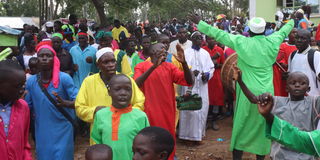
Members of Roho Church dance during the funeral service of former Superior Cardinal Joseph Ager Yugi at Gul Kagembe Village in Rangwe Constituency on January 14, 2024.
Mr Oboyo says a widow or widower is not allowed to have another relationship with the opposite sex before this activity.
"We usually allow a bereaved man or woman to have a relationship after the suda. The new parents are usually related to the deceased," he says.

